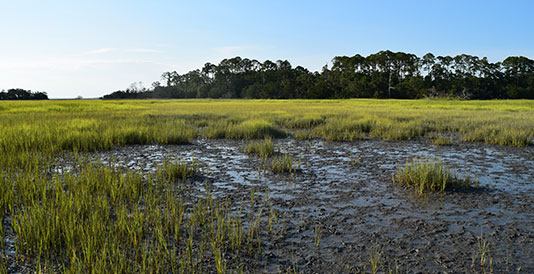 August 19, 2016 - Coastal ecosystems worldwide are feeling the heat of climate change. In the Southeastern U.S., salt marshes have endured massive grass die-offs as a result of intense drought, which can affect everything from fisheries to water quality. Now, new research shows that a mutualistic relationship -- where two organisms benefit from each other's activities -- between ribbed mussels and salt marsh grasses may play a critical role in helping salt marshes bounce back from extreme climate events such as drought.
August 19, 2016 - Coastal ecosystems worldwide are feeling the heat of climate change. In the Southeastern U.S., salt marshes have endured massive grass die-offs as a result of intense drought, which can affect everything from fisheries to water quality. Now, new research shows that a mutualistic relationship -- where two organisms benefit from each other's activities -- between ribbed mussels and salt marsh grasses may play a critical role in helping salt marshes bounce back from extreme climate events such as drought.
The results, reported this week in the journal Nature Communications, found that mussels piled up in mounds around salt grass stems helped to protect the grasses by improving water storage around their roots and reducing soil salinity. With the mussels' help, marshes can recover from drought in less than a decade. Without their help, it can take more than a century.
"This is a very good example of how the diversity of life in a salt marsh promotes resilience to climate and environmental change," said David Garrison, program director in the National Science Foundation (NSF) Division of Ocean Sciences, which co-funded the research with NSF's Division of Environmental Biology.
"It's a story of mutual benefit between marsh grass and mussels," said Christine Angelini, a scientist at the University of Florida and lead author of the paper. The mussels, she said, "protect then accelerate the healing of drought-stricken marshes."











